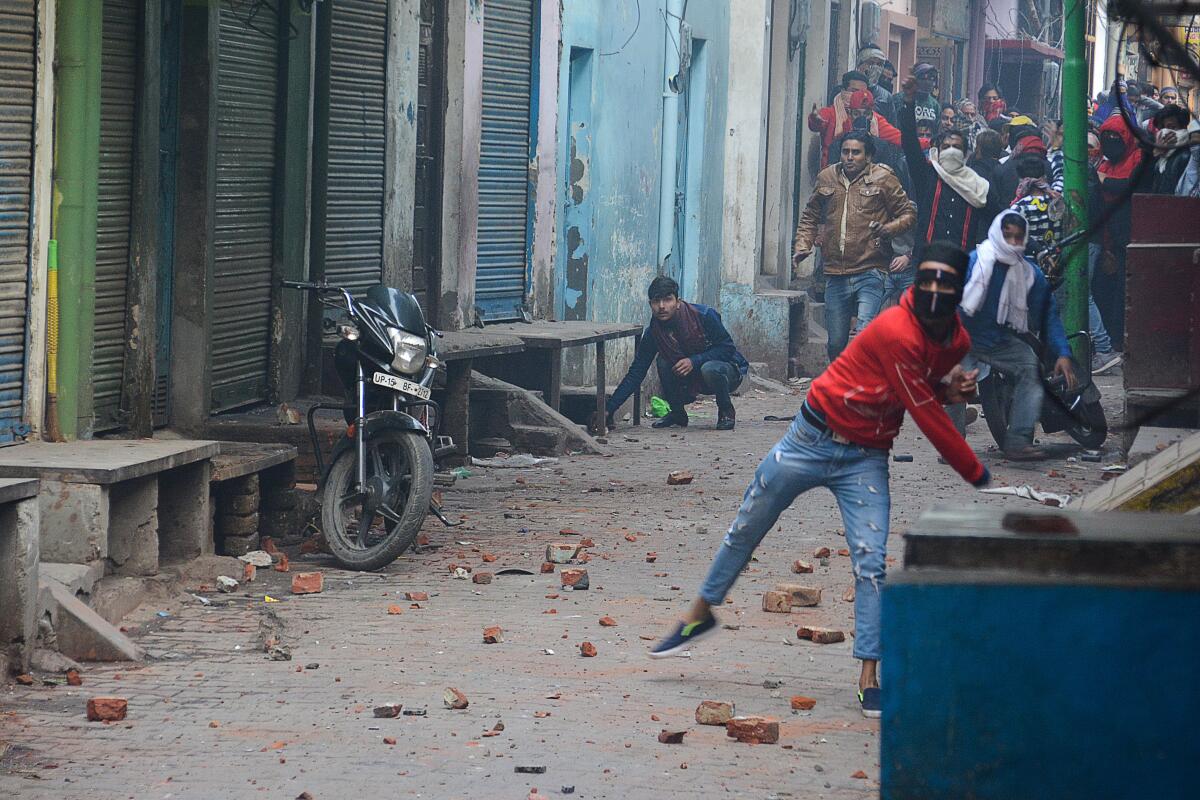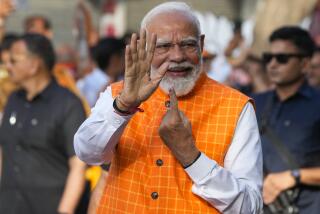India’s largest state is trying to fine Muslims — for crimes they say they didn’t commit

- Share via
MEERUT, India — Mohammad Naushad was at home last week when police showed up with a written notice: He was being investigated on suspicion of damaging property during a recent protest over a controversial new citizenship law.
The notice required the shopkeeper to prove his innocence to local authorities or possibly face a stiff fine.
He told the officers he couldn’t possibly be guilty -- because he hadn’t gone anywhere near the Dec. 20 protest, one of several demonstrations in the northern state of Uttar Pradesh that turned deadly last month after police moved in. Statewide, at least 19 people were killed, including six in Meerut.
Muslim leaders say the government crackdown has continued in the form of hundreds of accusations against Muslims -- without due process -- for arson, stone-throwing, destruction of police vehicles and other crimes.
“It’s all about intimidating Muslims,” said Saba Naqvi, an author and political commentator. “It’s sending a message to them not to raise their voices or to protest.”
Home to 200 million people, Uttar Pradesh is India’s most populous and arguably its most politically important state -- and a hotbed of Hindu nationalism that is fueling nationwide repression of the country’s Muslim minority.
Since winning power in 2014, Prime Minister Narendra Modi has pursued a Hindu nationalist agenda that critics say has marginalized Muslims, who make up about 14% of the country’s 1.3 billion people.
Modi’s government has imposed harsh measures against India’s only Muslim-majority territory, Kashmir. In some states, bans on slaughtering cows -- which are revered in Hinduism -- have emboldened Hindu vigilante groups to attack Muslims and other minorities suspected of eating beef.
In early December, the government passed a law that provides a pathway to Indian citizenship for refugees from three neighboring countries -- Afghanistan, Bangladesh and Pakistan -- but excludes Muslims. It is the first time that India, founded as a secular republic in 1947, has used religion as a basis for citizenship.
Opponents of the law staged protests in several cities across the country. The police response was harshest in Uttar Pradesh, which is headed by Yogi Adityanath, a firebrand Hindu priest who was appointed by Modi in 2017 and has long been known for his religiously inflammatory rhetoric.
He has advocated for turning India into a Hindu rashtra, or homeland, and in 2007, after a Hindu boy died in a clash between Hindus and Muslims during a religious festival, gave a fiery speech urging that the boy’s death be avenged -- sparking riots that left 10 people dead.
At the protests last month, officers in some areas opened fire with bullets and tear gas, ransacked homes, beat children, and in one case even reportedly used stun grenades.
Police in Meerut say they only shot in the air for crowd control and deny opening fire on protesters or killing anyone, despite many eyewitness and video accounts to the contrary.
After the protests, Adityanath said his government would take revenge against demonstrators and seize the assets of those who damaged public property. Authorities in Meerut estimate the damage to public property, including police vehicles, at around $570,000.
“Every rioter is shocked,” his office tweeted. “Every demonstrator is shocked. Everyone has been silenced after seeing Yogi Adityanath government’s stern intentions.”
At least 372 “damage notices” have been issued across the state, according to media reports, which said fines would be about $350 -- a month of income or more for many.
Those served with legal notices were told they were identified on closed-circuit video footage and directed to visit police stations to answer the allegations. Authorities have dismissed accusations that innocents are being targeted.
“Only those people who have caused damage [will] pay,” said Akhilesh Narayan Singh, the police superintendent in Meerut.
But Singh’s motivations were called into question after he was caught on a video scoffing at the concerns of the demonstrators with a taunt commonly directed at Indian Muslims who criticize their country: “Tell them to go to Pakistan.”
Critics of the government also point out that damage notices were not issued after violence by pro-Hindu mobs, including a 2018 incident in which a police officer was shot and killed.
“Do they have any evidence against us? [If they do] we are ready to be criminals,” said Naushad, 37. “What is the point in making us criminals for no reason?
“The police can do anything here ... they can even shoot” people, he said.
Naushad went to the police this week to plead his innocence. While he waits for a magistrate to decide whether he must pay, a group of Muslims in the city of Bulandshahr, about 40 miles south of Meerut, was not taking any chances.
After 12 men were arrested for torching a police vehicle at a Dec. 20 demonstration, Muslim community leaders paid local authorities $9,000 in compensation -- even though nobody in the city received a damage notice and the leaders believed those arrested were innocent.
“We got worried and decided that if we pay the money, it will be better,” said Haji Akram Ali, a community leader involved in the decision. “We all agreed to do it since it saves a lot of people a lot of trouble.”
He said that in return district authorities promised not to harass or falsely accuse Muslims.
The top administrative official said that “the Muslims of Bulandshahr have made a good start” and that the gesture “should come as an inspiration for others.”
But Abrar Ahmed Ansari, a local fabric shop owner, said that the preemptive payment sets a bad precedent and was made only out of fear.
“We fear that police might just pick up anyone’s son,” he said. “So people with money compensated [authorities] to avoid any more violence to Muslim families.”
“The [government’s] tactics are working 100%,” he said. “They want to make it a Hindu nation and see Muslims as second-class citizens. One country, one religion.”
Ansari remembered unrest in Bulandshahr a few years ago that resulted in damage to his storefront. Nobody paid him for the repairs, he said.
Malhotra is a special correspondent. Special correspondent Prashun Mazumdar contributed to this report.
More to Read
Sign up for Essential California
The most important California stories and recommendations in your inbox every morning.
You may occasionally receive promotional content from the Los Angeles Times.










